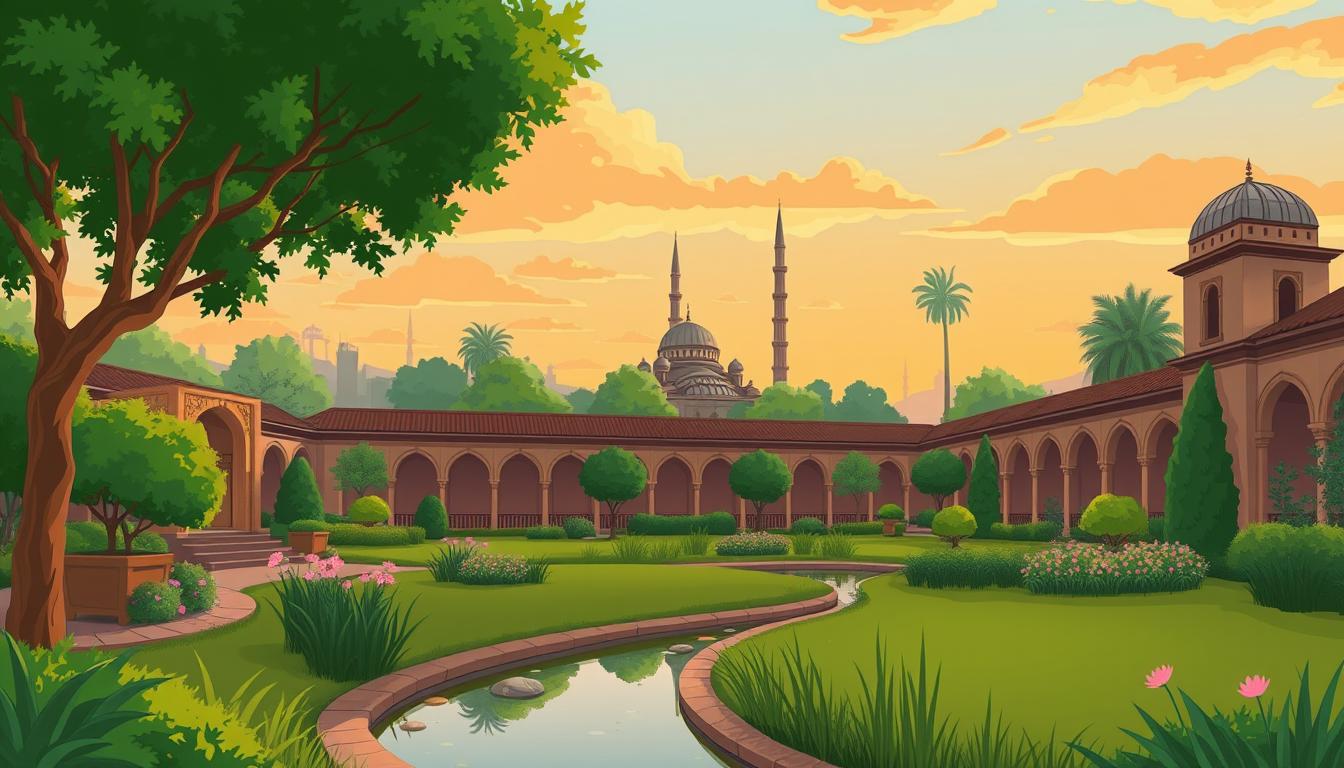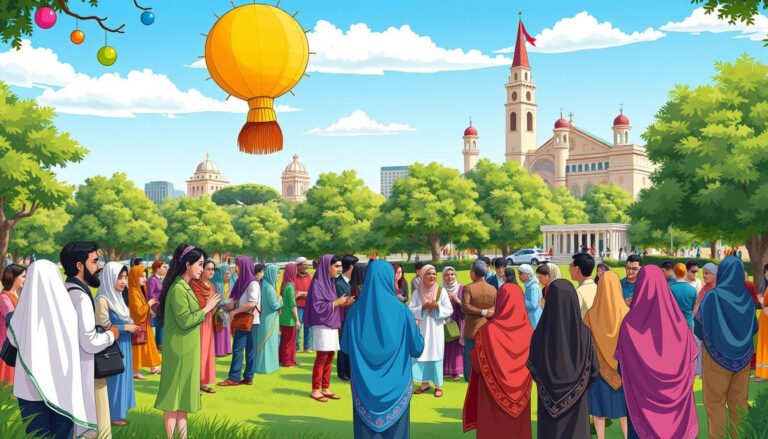Islam in the United Kingdom
Islam is the second-largest religion in the United Kingdom, with results from the 2021 Census recording just under four million Muslims, or 6.0% of the total population in the United Kingdom. London has the largest population and greatest proportion (15%) of Muslims in the country. The vast majority of British Muslims in the United Kingdom adhere to Sunni Islam, while smaller numbers are associated with Shia Islam. Over time, Islam has had a significant cultural impact in Britain, with early evidence of Islamic influence dating back to the 8th century when King Offa of Mercia minted coins with Arabic inscriptions. Under the British Empire, the UK ruled over large Muslim populations, particularly in India, which influenced the development of a distinct Muslim identity in the country. Today, the British Muslim community is diverse, with origins spanning South Asia, the Middle East, Africa, and Europe, and making important contributions to various sectors of British society.
Key Takeaways
- Islam is the second-largest religion in the United Kingdom, with a population of nearly 4 million Muslims
- London has the highest concentration of Muslims, accounting for 15% of the city’s population
- The majority of British Muslims follow Sunni Islam, with smaller Shia and Ahmadiyya communities
- Islam has a long history in Britain, with evidence of cultural influence dating back to the 8th century
- The British Muslim community is diverse, with origins from various regions around the world
Introduction to Islam in the United Kingdom
The British Muslim population has experienced significant growth and diversity in recent decades. According to the 2021 Census, there are approximately 3.8 million Muslims living in England, comprising 6.7% of the total population. This Muslim population has increased by nearly 75% between 2001 and 2011, and then by an additional 43% between 2011 and 2021.
Overview of Muslim Population and Demographics
British Muslims come from a wide range of ethnic and national backgrounds, with the largest communities originating from South Asia, particularly Bangladesh, Pakistan, and India. There are also significant Arab, African, Turkish, and European Muslim communities, as well as a growing number of British converts to Islam.
Diversity of British Muslim Communities
The diversity of British Muslim communities is reflected in their religious practices and institutions. For example, Shariʿa councils, which handle religious matters like divorce, have a higher prominence in the UK compared to other Western countries, showcasing a unique aspect of Islamic practice in the UK. These councils represent distinct experiments in meeting Muslims’ needs in a Western society, emphasizing the diverse approaches taken by British Muslims in developing religious institutions.
“The book ‘On British Islam’ examines the dynamics of Islamic institutions in Britain, focusing on shariʿa councils, which handle religious matters like divorce. Each council represents a distinct experiment meeting Muslims’ needs in a Western society, emphasizing the diverse approaches taken by British Muslims in developing religious institutions.”
The British Muslim population’s diversity and growth have led to ongoing debates and adaptations within the UK’s legal and social frameworks. Understanding the nuances of this population is crucial for fostering inclusive and harmonious communities.
Early History of Islam in Britain
The earliest evidence of Islamic influence in England can be traced back to the 8th century, when King Offa of Mercia minted coins with Arabic inscriptions, largely copying the designs of contemporary Abbasid caliphs. This suggests the existence of between England and the Islamic world during the medieval period.
By the 16th century, Muslims from North Africa, the Middle East, and Central Asia were present in London, working in various roles, from diplomats and translators to merchants and musicians. Islamic scholarship, particularly in the fields of philosophy and science, was also well-known among the learned in England by the 14th century, as reflected in the writings of Geoffrey Chaucer.
Evidence of Islamic Influence in Medieval England
One of the earliest examples of can be seen in the minting of coins by King Offa of Mercia in the 8th century. These coins featured Arabic inscriptions, suggesting the existence of trade and cultural exchanges between England and the Islamic world during this time.
Trade and Cultural Exchanges with the Islamic World
- The presence of Muslims in London as diplomats, translators, merchants, and musicians by the 16th century indicates the of trade and cultural exchanges between England and the Islamic world.
- Islamic scholarship, particularly in the fields of philosophy and science, was well-known among the learned in England by the 14th century, as evidenced in the writings of Geoffrey Chaucer.
Interactions under the British Empire
As the British Empire grew, particularly in India, the UK came to rule over a large Muslim population. Under the British Raj, the colonial authorities forged a distinct Muslim identity for the local Muslim population, in part due to the way they categorized South Asian history into an “ancient” Hindu period and a “medieval” Muslim period, with the colonial era being classified as “modern.” This contributed to the development of a more cohesive Muslim identity, even though Muslims of various ethnic and regional backgrounds did not initially find their religious identity to be particularly salient.
Muslims in the British Indian Army
Additionally, a significant number of Muslims from the Indian subcontinent served in the British Indian Army during the First and Second World Wars, with some being awarded the Victoria Cross, Britain’s highest military honor. These Muslims in the British Indian Army played a crucial role in the operations of the British Empire and their service had a lasting impact on the identity of the Muslim community in the region.
Impact of British Rule on Muslim Identity
The British rule had a profound impact on the Muslim identity in the Indian subcontinent. The colonial authorities’ categorization of history and their interactions with the local Muslim population contributed to the formation of a more unified Muslim identity, even though the community was diverse in its ethnic and regional backgrounds. This process of identity formation under the British Empire had far-reaching consequences that continue to shape the experiences of Muslims in the region.
“The colonization of India had a complex and often chaotic relationship with the Hajj, highlighting the variegated and complicated nature of British imperialism.”
Islam in the United Kingdom Today
The British Muslim community is one of the most diverse in the world, with the largest groups originating from South Asia, particularly Bangladesh, Pakistan, and India. There are also significant Arab, African, Turkish, and European Muslim communities, as well as a growing number of British converts to Islam. These major British Muslim communities have a rich and varied history, with origins spanning centuries.
Contributions of British Muslims to Society
British Muslims have made important contributions to various sectors of British society, from small businesses and restaurants to the National Health Service, education, politics, media, sports, arts, and fashion. The Muslim community in the UK has an estimated spending power of £20.5 billion and is a young and growing population, with the majority being under the age of 19.
British Muslims have played a significant role in shaping the cultural and social fabric of the United Kingdom. From entrepreneurship to public service, this community has made invaluable contributions that have enriched the nation. As the UK continues to evolve, the role of British Muslims will undoubtedly remain an integral part of its diverse and vibrant society.
Growth and Challenges of the Muslim Population
The Muslim population in the United Kingdom has experienced remarkable growth in recent decades. Between 2001 and 2011, the Muslim population increased by almost 75%, and then by an additional 43% between 2011 and 2021. This rapid growth has been driven by both immigration and higher birth rates within the Muslim community.
The growing Muslim population has brought about various challenges, including integration, social and economic disparities, and instances of Islamophobia and discrimination. These challenges have led to ongoing discussions and efforts to promote greater inclusion and understanding within British society.
According to Pew Research, Muslims are projected to make up 8% of the UK population by 2030, and currently, 8.1% of all school-age children in the UK are Muslim. Additionally, the Policy Exchange report in 2016 found that 53% of Muslims in the UK were born outside the country, with 93% having parents born abroad, indicating substantial growth through immigration.
The integration of Muslim communities has been a complex issue, with reports highlighting concerns regarding the adoption of Sharia law and the creation of a parallel legal system, particularly affecting women’s rights. Additionally, British intelligence agencies monitor over 3,000 home-grown Islamist extremists and have identified 20,000 individuals posing a residual risk.
“The 2016 report by Dame Louise Casey highlighted issues regarding the integration of religious minorities, particularly Muslims, in British society.”
Despite these challenges, the UK has also embraced the diversity of its Muslim population, becoming the first non-Islamic country to issue a sovereign Sharia bond in 2014, and with over 20 banks offering Sharia-compliant products and serving more than 100,000 customers.
The growth and challenges faced by the Muslim population in the UK reflect the broader societal changes and discussions surrounding integration, diversity, and the role of religion in a modern, multicultural Britain.
Islam in the United Kingdom by Region
The Muslim population in the United Kingdom is diverse and spread across various regions. London has the largest concentration, with over 1.3 million Muslims, comprising around 15% of the city’s total population. Other major urban areas with significant Muslim communities include the West Midlands, the North West, and Yorkshire and the Humber.
Muslim Communities in London
London’s Muslim population reflects the diversity of the British Muslim community, with a mix of South Asian, Middle Eastern, African, and European backgrounds represented. Neighborhoods like Tower Hamlets, Newham, and Waltham Forest have particularly high concentrations of Muslim residents, many of whom have deep roots in the city.
Muslim Communities in Other Major Cities
While London dominates the Muslim landscape in the UK, other major cities also have thriving Muslim communities. Birmingham, the second-largest city, has a Muslim population of around 234,000, making up over 21% of the city’s residents. Manchester, Leeds, and Bradford also have sizeable Muslim populations, each with their unique cultural and demographic characteristics.
These regional Muslim communities often mirror the diverse origins of the British Muslim population, with a blend of South Asian, Middle Eastern, African, and European backgrounds represented. The growth and evolution of these communities have been shaped by historical migration patterns, socioeconomic factors, and the ongoing integration of Islam into the fabric of British society.
“The United Kingdom’s Muslim population has become an integral part of the country’s social and cultural landscape, contributing to the rich diversity that defines modern British identity.”
Religious Practices and Observances
The religious practices and observances of British Muslims are diverse, reflecting the community’s rich cultural heritage. While the vast majority adhere to Sunni Islam, the UK is also home to a significant Shia Muslim population.
Sunni and Shia Islam in the UK
Sunni Islam is the predominant form of the religion practiced by British Muslims, accounting for over 80% of the Muslim population. These individuals follow the teachings and traditions of the Sunni branch of Islam, which emphasizes the importance of the Quran and the example of Prophet Muhammad, known as the Sunnah.
On the other hand, a smaller but significant portion of British Muslims belong to the Shia branch of Islam. These individuals have a distinct set of beliefs and practices, including the veneration of the Prophet’s descendants and the observance of specific religious festivals, such as Ashura.
Regardless of their sectarian affiliation, British Muslims share many common religious practices, such as the five daily prayers, fasting during the holy month of Ramadan, and the annual Hajj pilgrimage to Mecca.
Mosques and Islamic centers play a crucial role in the religious and community life of British Muslims, serving as places of worship, education, and social gathering. These institutions provide a space for individuals to come together, engage in religious observances, and foster a sense of community.
“The diversity of religious practices among British Muslims reflects the richness of the community’s cultural heritage and the deep-rooted connections to their faith.”
As the Muslim population in the UK continues to grow, the observance of religious practices and the maintenance of cultural traditions have become increasingly important for the community’s identity and sense of belonging.
Islamic Institutions and Organizations
The United Kingdom is home to a diverse range of Islamic institutions and organizations, playing a vital role in preserving and promoting Islamic traditions and values within the British Muslim community. From mosques and Islamic centers to educational, charitable, and advocacy groups, these establishments serve as hubs of religious and community life for British Muslims.
Mosques and Islamic Centers
Mosques and Islamic centers are the backbone of Islamic institutions in the UK. They provide spaces for worship, education, and social activities, catering to the spiritual and communal needs of British Muslims. The country’s largest mosque by capacity is the Bradford Grand Mosque, located in Yorkshire.
These institutions have witnessed significant growth over the years, with the number of registered mosques in England and Wales increasing from 13 in 1963 to 584 by 1999. This expansion reflects the growing Muslim population in the UK, which is estimated to be around 2 million, with over two-thirds originating from the Indian subcontinent.
Mosques and Islamic centers play a crucial role in preserving Islamic traditions and promoting understanding within the broader British society. They serve as gathering places for the community, fostering a sense of identity and belonging among British Muslims.
The diversity of Islamic institutions in the UK is further evident in the presence of various organizations, such as the Muslim Council of Britain (MCB), the largest Muslim umbrella organization in the country. The MCB works to ensure British Muslims are accurately represented in the media and challenges Islamophobia, while also producing valuable research on the life of British Muslims.
These mosques and Islamic centers in the UK serve as vital hubs for the British Muslim community, fostering a strong sense of identity and belonging, while also playing a crucial role in promoting understanding and dialogue within the broader British society.
Islam in the United Kingdom in Literature and Arts
The influence of Islam and Muslim characters has had a notable impact on British literature and the arts over the centuries. In the 16th and 17th centuries, renowned playwrights such as William Shakespeare and George Peele featured Moorish and Muslim characters in their works, reflecting the growing cultural exchange between England and the Islamic world.
Plays like The Merchant of Venice, Titus Andronicus, and Othello showcased the increasing fascination with Islamic cultures, while turbans and other Islamic-inspired fashion trends were seen among the upper classes as a form of exotic dress. This early exposure to Muslim influences laid the groundwork for a lasting legacy of Islam in British literature and arts.
In more recent times, Muslim authors and artists have made significant contributions to the United Kingdom’s creative landscape, further enriching the country’s cultural diversity. From renowned writers to acclaimed painters and musicians, the Muslim presence has become an integral part of the British artistic tapestry, shaping the nation’s literary and artistic traditions.
“On British Islam” by John Bowen, a professor at Washington University in St. Louis, has been praised for its insights into the everyday lives of Muslims in the UK and their efforts to establish institutions that align with both Islamic and British principles.
The interplay between Islam and British culture, as reflected in literature and the arts, has played a crucial role in fostering a deeper understanding and appreciation of the Muslim community’s influence on the United Kingdom’s cultural fabric.
Political Participation and Representation
British Muslims have become increasingly engaged in the country’s political processes, with growing representation in local and national government. One notable example is the election of Sadiq Khan as the Mayor of London in 2016, making him the first Muslim to hold a major elected office in the UK. British Muslims have also been active in advocacy and lobbying efforts, working to ensure their concerns and interests are represented in the political sphere.
According to recent data, over half of British Muslims reside in 50 parliamentary seats, with some constituencies like Bethnal Green and Bow (East London) and Bradford West nearing 40% Muslim population. This significant presence has translated into increased political representation, with around 200 Muslims represented in British local government, including 30 Muslim local councillors in the London Borough of Tower Hamlets, 24 in Bradford, and 17 in Birmingham city council.
At the national level, there are currently 8 Muslim Members of Parliament, 2 British Muslim Members of the European Parliament, 2 Muslim Members of the Scottish Parliament, and 1 Muslim Member of the National Assembly for Wales. These representatives come from a variety of political parties, including Labour, Conservative, SNP, and Plaid Cymru, with Labour being the party most represented by Muslim politicians.
The Respect Party, dominated by Muslim leaders, has also made significant electoral impacts in East London, Birmingham, and Bradford, reducing Labour’s support in certain areas and achieving representation in local and national government. This is notable considering the electoral disadvantage minor parties face in Britain due to the ‘winner takes all’ voting system.
Despite these advancements, challenges remain in terms of equal representation and inclusion, as the Muslim community continues to navigate its role within the broader British political landscape. Ongoing efforts to increase political participation and ensure the diverse voices of British Muslims are heard will be crucial in the years ahead.
“The relationship between Labour and Muslim communities has traditionally been strong, with most Muslim members of political parties affiliated with Labour.”
Integration and Challenges Faced by British Muslims
The integration of British Muslims into the wider society has been a complex and multifaceted issue. While the Muslim community in the UK is diverse, contributing significantly to British culture and economy, they have faced various challenges related to social cohesion and acceptance.
One of the primary issues is the prevalence of Islamophobia and discrimination. Despite efforts to promote interfaith dialogue and address prejudice, British Muslims have experienced incidents of hate crimes, employment discrimination, and social marginalization. This has hindered their full integration and participation in mainstream society.
Socioeconomic disparities also pose a barrier to the integration of British Muslims. Studies have shown that Muslim communities, particularly those of Pakistani and Bangladeshi origin, tend to experience higher levels of poverty, unemployment, and educational attainment gaps compared to the general population. Addressing these inequalities is crucial for fostering a more inclusive and equitable society.
“The integration of British Muslims is not just about cultural assimilation, but about ensuring equal opportunities and addressing systemic barriers to their full participation in society.”
Efforts to promote the integration of British Muslims have included initiatives to strengthen interfaith cooperation, enhance representation in politics and public institutions, and develop community-based programs that address issues such as language barriers, cultural differences, and social isolation. However, more work is needed to create a truly inclusive environment where British Muslims feel a sense of belonging and can thrive alongside their fellow citizens.
The challenges faced by the British Muslim community are multifaceted, but with a concerted effort from all stakeholders, including the government, civil society, and the Muslim community itself, progress can be made towards greater integration and social cohesion. By addressing Islamophobia, promoting equal opportunities, and fostering intercultural understanding, the UK can strive to become a more inclusive and welcoming society for people of all backgrounds.
Conclusion
The story of Islam in the United Kingdom is one of rich history, diverse communities, and notable contributions to British society. From the ancient cultural exchanges with the Islamic world to the rapid growth of the British Muslim population in recent decades, the presence of Islam has left an indelible mark on the nation.
Today, the British Muslim community represents a vibrant and integral part of the country’s fabric, with origins spanning the globe and a strong commitment to integration and participation in all facets of public life. While challenges, such as Islamophobia and issues of inclusion, persist, ongoing efforts to promote understanding and acceptance are crucial to ensuring the continued prosperity and integration of this dynamic community.
As we reflect on the past and look to the future, it is clear that Islam has become an integral part of the United Kingdom’s cultural and social landscape. Through the invaluable contributions of British Muslims and the collaborative work to bridge divides, the story of Islam in the UK continues to unfold, shaping the nation’s identity and future in profound ways.
Source Links
- Islam in the United Kingdom
- Islam in England
- On British Islam
- Factsheet: Islam in Britain – Religion Media Centre
- Islam and Muslims in Britain
- BBC – Religions – Islam: History of Islam in the UK
- Muslims and Islam in the UK
- Empire and Pilgrimage: The Hajj in Britain’s Muslim Empire
- The British Empire and the Hajj — Harvard University Press
- Exiled at home: British Muslims’ experiences of integration
- British Muslims | Muslim Council of Britain
- Amid UK riots, British Muslims in Liverpool working to heal
- Third of Britons believe Islam threatens British way of life, says report
- Europe’s Growing Muslim Population
- The Challenge of Islam in the UK – Affinity
- Religion, England and Wales – Office for National Statistics
- United Kingdom – Christianity, Islam, Judaism
- The diverse origins of Britain’s Muslims
- Religion in the United Kingdom
- The Challenge of Islam in the UK
- Muslim Council of Britain (MCB): Empowering British Muslims
- The Penetration of Islamist Ideology in Britain
- On British Islam
- Britain and Islam
- Microsoft Word – MPCG – WP1 – A Brief Introduction.doc
- Microsoft Word – EUP chapter.doc
- Muslims in Great Britain and their Struggle with Identity
- Chapter 212: Muslim Integration Issues In British Society
- United Kingdom – United States Department of State
- Muslims face ‘worsening environment of hate’ in UK







